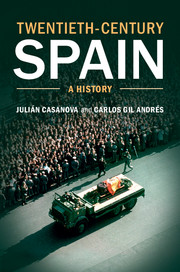Book contents
- Frontmatter
- Contents
- List of illustrations
- Key figures
- List of abbreviations
- Twentieth-century Spain timeline
- Maps
- Introduction
- Part I The monarchy of Alfonso XIII
- Part II The Second Republic
- Part III The Civil War
- Part IV Franco’s dictatorship
- Part V Transition and democracy
- Guide to further reading
- Index of names and authors
- References
Introduction
Published online by Cambridge University Press: 05 July 2014
- Frontmatter
- Contents
- List of illustrations
- Key figures
- List of abbreviations
- Twentieth-century Spain timeline
- Maps
- Introduction
- Part I The monarchy of Alfonso XIII
- Part II The Second Republic
- Part III The Civil War
- Part IV Franco’s dictatorship
- Part V Transition and democracy
- Guide to further reading
- Index of names and authors
- References
Summary
‘In all their affairs, nothing is ever quite what it seems. We grope in a sort of fog when we try to understand them.’ The quote comes from The Spanish Labyrinth, the book that Gerald Brenan began writing in Great Britain while Spain was steeped in the blood of a civil war. The author was almost sick with worry and shock, horrified as he was by the ‘hysterical frenzy of killing and destruction’ that he had seen with his own eyes in the summer of 1936, before he left the peninsula. Spain was his intellectual passion. In 1919 he had crossed the ‘whole yellow ox hide’ travelling in dirty third-class train carriages overflowing with peasants with their chickens and bundles of vegetables; he had slept in humble inns with their straw mattresses crawling with bedbugs and fleas, until he found the retreat he had been looking for, a small village lost in the Alpujarras, a landscape that seemed more like the mountains of Afghanistan or the Berber villages of North Africa than the heavily populated Europe he had come from, overshadowed by the devastating experience of the Great War.
Brenan saw Spain as being the country of a glorified feeling of ‘the homeland’, eastern thought, hunger and supply shortages, vast agricultural injustice, the almost religious fervour of popular anarchism, permanent calls to revolution, a country difficult to govern even at the best of times. In his opinion, the Civil War had been the explosion in the powder magazine that had slowly been accumulating, the scene of a drama in which the fortunes of the civilised world were being played out in miniature. Spain was not isolated from events in Europe, but its inhabitants were confronting very different social and economic situations which mirrored the political trends of the great powers only superficially and belatedly. ‘Everything to be found in Spain is sui generis.’ In 1949 Brenan went back and found a society held back by hardship, overcome by the worst sort of hangover, ‘the type that follows a civil war and reign of terror’. In the 1950s he returned for good to live in a country ‘in the disguise of modern European customs which it does not fit in with, and against which it offers a constant and not entirely conscious resistance’, a territory which he still defined as ‘enigmatic and disconcerting’.
- Type
- Chapter
- Information
- Twentieth-Century SpainA History, pp. 1 - 6Publisher: Cambridge University PressPrint publication year: 2014

